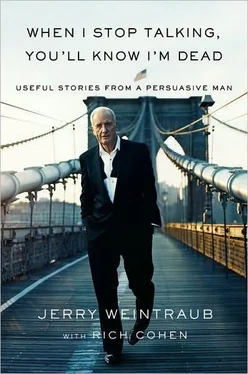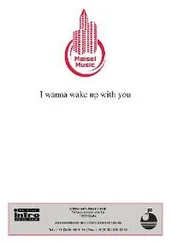I said, "Look, Elvis. I am sorry, but I can't. That's not going to happen."
We talked for a little, then hung up. I could not fall back asleep. I stared at the ceiling, thinking. A few days before, I had seen a copy of Life magazine with a man named Gordon Mills on the cover, a music manager from London. According to the article, his management company, MAM, which was traded on the London Stock Exchange, was the most successful in the industry, representing two of the three biggest stars in the world: Tom Jones and Engelbert Humperdinck. Now it happened that these stars were numbers two and three. Elvis was number one.
I went to see the Colonel at six the next morning. He was drinking coffee. I threw Life magazine in front of him.
"What's this?" he asked.
"That," I said, "is Gordon Mills."
"Yeah, so?"
"Look, Colonel, what if I told you I had a way to make a hundred million bucks just like that?"
"I would tell you to keep talking," he said.
"I'm not going to bullshit you," I told him. "Elvis called me in the middle of the night and said he wants to get rid of you and make me his manager."
The Colonel made a noise like this: "Ahhhieeee."
I said, "Now, Colonel, I've had enough clients, done enough business, and been around long enough to know it doesn't mean anything. Elvis is you and Elvis. I get that. But it gave me an idea, seeing as he's talking about getting a new manager, and this is where the hundred million bucks comes in."
"Go on."
"This guy, Gordon Mills, has a publicly traded management company. He also has two of the three biggest recording artists in the world. Now here's my idea: We sell him Elvis's management contract. In name only. It will still be you running the show, but this guy will hold the paper. We structure this deal in stock, so Mills gets the contract and we-me, you, Elvis-get shares in his company. Lots of shares. Then, when word gets out that Gordon Mills has Tom Jones, Engelbert Humperdinck, and Elvis Presley, well, the share price goes through the roof. And we clear a hundred million easy."
"Yeah," said the Colonel. "Do it."
I called Gordon Mills and told him I had an idea, a surefire moneymaker.
"Great," he said. "Come over and explain it."
I would never sell an idea like this on the phone. It's still that way. I need to sit with a person, to watch him, read his eyes and hands, see if he is just as excited as I am, if I'm coming across.
I got on a plane and flew over. Gordon Mills lived in a mansion outside London. He had his own zoo. (A lot of rich people in England have zoos.) He was a poor kid from the East End who had made it all the way to a private zoo. We talked in his garden. Giraffes wandered by, zebras, and tigers. A lion cub pissed my lap! I explained the plan: how we would sell Elvis but not sell Elvis, how he would give us shares, how the stock price would rise. Gordon nodded through this, thinking Elvis, Elvis, then said, "Fantastic, Jerry! Let's do it!"
"Now look, Gordon, I want to make sure you understand the situation," I said. "You are not really going to manage Elvis. He won't accept that. I am talking about a business arrangement. You will sign the contracts and get commissions, but on the ground we will continue as we have been: I will handle the concerts, the Colonel will handle everything else; you will be his manager in name only. You will not talk to Elvis, or try to shape his career, and you will have absolutely no creative input. Get it?"
"Yes, yes, great. Let's do it."
"That's the first caveat," I said. "Here's the second: You can't tell anybody about this. I don't want to pick up the Daily Telegraph or the Sun and see splattered all over the pages, 'Gordon Mills to Be Elvis's Manager.' You can have that later, but not now. You've got to wait for that."
"Great, let's do it."
A few weeks later, Gordon Mills came to Vegas. The Colonel was there, too. It took me two weeks to set up a meeting. Tom Jones worked at Caesars and Elvis worked at the Hilton. Each manager wanted to meet on his home turf. I shuttled back and forth like Kissinger. I finally fixed a date at the Hilton. The Colonel won that round. He showed up in cowboy suit and hat. He sat on one side of the table, and Gordon sat on the other. These men had egos bigger than the moon. They would not talk to each other. Everything had to go through me. The Colonel would say, "Tell him he's not to travel with us." Gordon would say, "Tell him Elvis must make himself amenable to European dates." It went back and forth like that for hours, but I finally got the parameters fixed. Then, just as we were leaving, Gordon said, "Hey, Jerry, as long as I'm here, I would love to see Elvis perform."
"No problem," I said. "I'll get you seats."
"There will be eighteen of us," he said.
"What do you mean, eighteen of you?" I asked. "Who's eighteen?"
"Well, you know, my arranger, my public relations people, my this, my that…"
I said, "Look, Gordon, I was very clear about this. No creative input. You'll blow the whole deal."
"No, I understand," he said. "They just want to see Elvis."
Okay.
After the show, Gordon came backstage. We were talking. He said, "You know, Jerry, I would love to meet Elvis. Just say hello."
"Okay, I'll bring you over."
Elvis walked out of his dressing room, smiling, exhilarated.
I said, "Elvis, this is Gordon Mills. The man I told you about, that situation we're going to do."
I had explained the plan to Elvis. He was fine with it, one, because it would mean a lot of money, and two, because nothing would change.
Elvis said, "Oh, yes, Mr. Mills, it's a great pleasure to meet you, sir. Jerry told me all about this, it sounds like a terrific thing. Very excited about it."
Then Gordon said-and here's the kicker; it still kills me, all these years later-"You know, Elvis, I wanted to talk to you about the capes you wear in the show. I have some ideas."
They talked for a minute, Gordon gesticulating, Elvis, head down, like a boxer in the corner, nodding, "Yes, sir," "Yes, sir," "Yes, sir."
Elvis then said, "Can you excuse me, Mr. Mills?" and went into his dressing room.
Gordon turned to me, smiling, and said, "Oh, that went well! What a charming man!"
A second later, one of Elvis's guys came over and whispered in my ear: "Jerry, Elvis wants to see you right away."
That was the end of Gordon Mills.
There's something to be learned from this story. It shows how, even if you have the greatest script in the world, it won't work if the actors don't play their parts.
The Colonel and I were like father and son. We loved each other, but fought all the time. He used to get up early on the road, five, five-thirty in the morning, then go down to the free buffet. He would smoke his cigar and eat bacon and eggs surrounded by the lackeys who hung on his every word. I usually sat with them, but one morning-this was later-I woke up cranky and decided to eat alone. I got my food, walked by the Colonel's table, sat by myself in the corner.
He called over, "What are you, some kind of a big shot?"
I ignored him.
He said, "Hey, can't you hear me, big shot?"
I said, "What, am I bothering you?"
You were never supposed to challenge the Colonel in front of his people. He believed it undermined his authority.
He shouted, "What's wrong with you?"
"I'm eating my breakfast," I told him. "I want to be alone."
"Oh, you want to be alone?" he said. "Good. Be alone. You're fired!"
"I'm fired? No problem. You owe me a million dollars for this tour so far. Let me have my million bucks, and I'm gone."
Of course, I did not want to get fired, but I knew he would never give me a million dollars.
He stormed over to my table. "All right, big shot, follow me."
He acted like he was taking me to his room for the payout. We got up there, a stuffy motel suite, bed unmade, clothes everywhere. He walked to the bureau, opened the swinging doors and there, inside, he had made up a shrine to the Buddha. There were candles and incense set around a gold sculpture of Buddha, with his belly and grinning face and grand fleshy ears. The Colonel started lighting the candles.
Читать дальше

![Сьюзан Кейн - Quiet [The Power of Introverts in a World That Can't Stop Talking]](/books/33084/syuzan-kejn-quiet-the-power-of-introverts-in-a-wo-thumb.webp)










